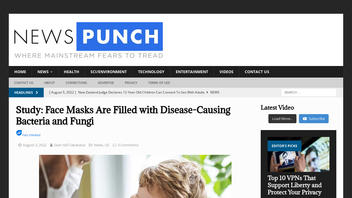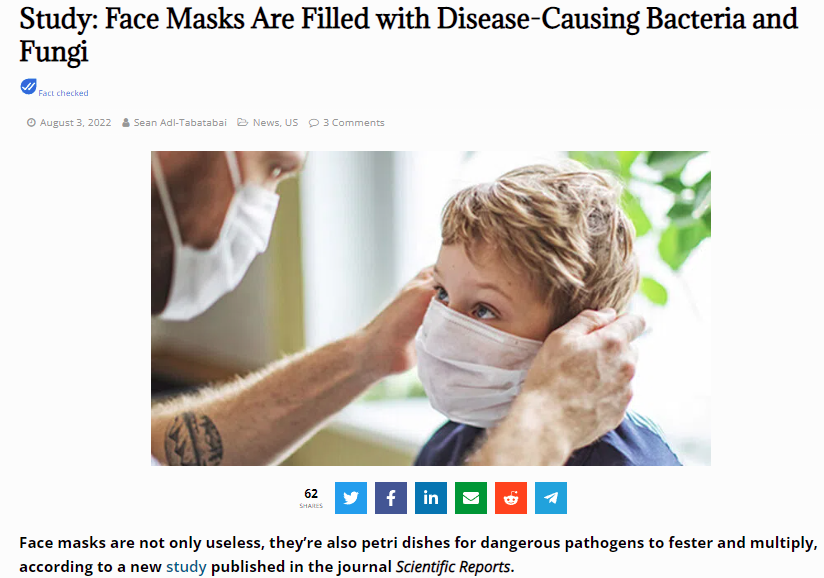STORY UPDATED: check for updates below.

Did a study find potentially disease-causing bacteria and fungi on face masks? Yes, that's true, but the study's authors only made one recommendation based on their findings and that was for immunocompromised people to avoid repeated use of masks to prevent infections. In an email to Lead Stories, study author Ah-Mee Park, an associate professor in the Department of Microbiology at Kindai University Faculty of Medicine in Japan said, "Most of the bacteria on the mask are harmless indigenous bacteria. A few pathogenic bacteria were detected."
The claim appeared in an article (archived here) published by News Punch on August 3, 2022, titled "Study: Face Masks Are Filled with Disease-Causing Bacteria and Fungi." It opened:
Face masks are not only useless, they're also petri dishes for dangerous pathogens to fester and multiply, according to a new study published in the journal Scientific Reports.
This is what the article looked at the time of writing:
(Source: News Punch screenshot taken on Fri Aug 5 15:54:54 2022 UTC)
The study cited in the article, "Bacterial and fungal isolation from face masks under the COVID-19 pandemic," was published in Scientific Reports via a process known as "open access." This is how the Cornell University Library describes it:
Open access (OA) refers to freely available, digital, online information. Open access scholarly literature is free of charge and often carries less restrictive copyright and licensing barriers than traditionally published works, for both the users and the authors.
While the News Punch headline reads, "Study: Face Masks Are Filled with Disease-Causing Bacteria and Fungi," the authors of the study it's based on came to no such conclusion. They also made no recommendations for the general public, but did for one particular group:
We propose that immunocompromised people should avoid repeated use of masks to prevent microbial infection.
The study also said:
Since masks can be a direct source of infection to the respiratory tract, digestive tract, and skin, it is crucial to maintain their hygiene to prevent bacterial and fungal infections that can exacerbate COVID-19.
In an August 5, 2022, email to Lead Stories, Park said the News Punch article misrepresents "our research findings":
The title of this report and the first bolded section [above] are very different from our research findings. ...
Most of the bacteria on the mask are harmless indigenous bacteria. A few pathogenic bacteria were detected. This fact is reversed in this [News Punch] report.
Additionally, indigenous and pathogenic bacteria cannot grow on the mask because they need water and nutrients to multiply. Describing the mask as a Petri dish is misleading.
According to Park, the message of the study is "wear a clean mask":
There are already many reports on the fact that non-woven masks are effective in protecting against viral (droplet) infections. In our study, we changed a perspective a little and focused on bacteria and fungi. Based on the results of our study as well as many other studies to date, it can be said that wearing a non-woven mask is effective in protecting against infection with SARS-CoV2 [COVID-19].
In another August 5, 2022, email to Lead Stories, Scott Pauley with U.S. Centers for Disease Control and Prevention said the agency could not comment on "this external study," but said the CDC does endorse the use of masks under most circumstances:
CDC recommends the use of layered prevention strategies -- like staying up to date on vaccines and wearing masks -- in order to help prevent severe illness and reduce the potential for strain on the healthcare system. Wear a mask with the best fit, protection, and comfort for you.
The CDC website also includes this advice:
When to throw away or change your mask
- Disposable masks should be thrown away after they're worn once.
- If you use respirators, check the manufacturer's instructions to learn how long they can be worn before they should be thrown away.
- Disposable masks and respirators that become wet or dirty should be thrown away in the trash right away. Do not continue to wear a wet or dirty mask. Replace it with a dry, clean mask.
The website for the Cleveland Clinic recommends a similar approach to mask use:
How dirty masks lead to sore throats
Dr. [Neha] Vyas says that viruses or germs residing in unwashed or unclean masks can possibly cause sore throats. If you're wearing that mask that's been in the car for weeks, stop. When you wear a dirty mask over and over again, you end up breathing in bacteria or viruses that might be trapped in the mask. That's why you should toss cloth masks in the wash after every use.
About News Punch
NewsPunch (formerly YourNewsWire) has published hoaxes and fake news articles in the past so anything they write or publish should be taken with a large grain of salt. Their Facebook page "The People's Voice" even lost its verification checkmark according to a 2018 report from Media Matters For America.
The Terms of Use of the site (archived here) also make it clear they don't really stand behind the accuracy of any of their reporting:
NEWSPUNCH, LLC AND/OR ITS SUPPLIERS MAKE NO REPRESENTATIONS ABOUT THE SUITABILITY, RELIABILITY, AVAILABILITY, TIMELINESS, AND ACCURACY OF THE INFORMATION, SOFTWARE, PRODUCTS, SERVICES AND RELATED GRAPHICS CONTAINED ON THE SITE FOR ANY PURPOSE.
RationalWiki described it as:
YourNewsWire (styled as YourNewsWire.com) is an Los Angeles-based clickbait fake news website known for disseminating conspiracy theories and misleading information, contrary to its claimed motto ('News. Truth. Unfiltered').
Updates:
-
2022-08-08T17:04:24Z 2022-08-08T17:04:24Z Adds context from study author, edits for clarity


















